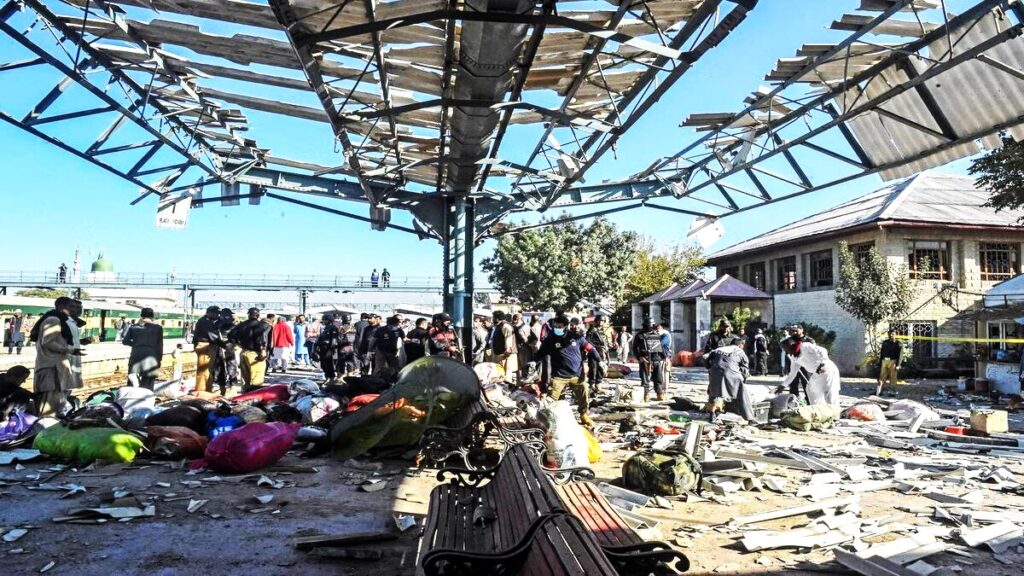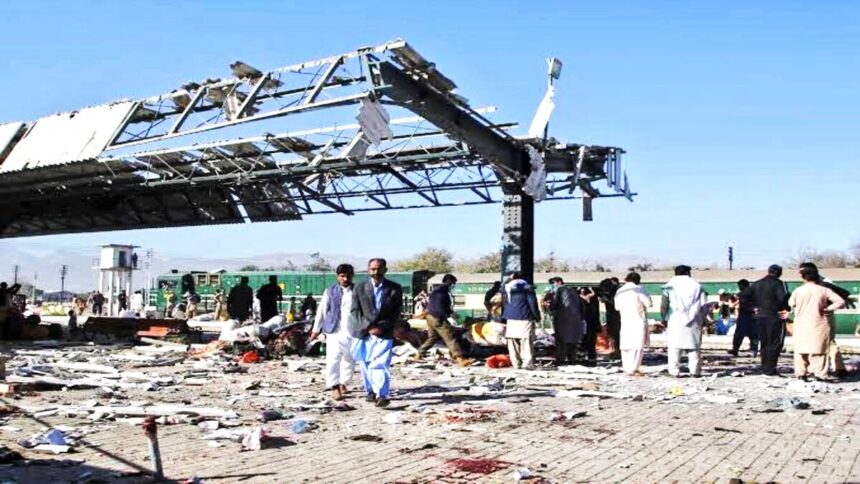At least 25 people were killed and more than 50 others injured in a suicide bombing at the main railway station in Quetta, Pakistan, on Saturday morning. The attack, which occurred during peak hours when the platform was crowded with passengers, has been claimed by the Baloch Liberation Army (BLA), a separatist militant group active in Pakistan’s restive Balochistan province.
Explosion Strikes Busy Platform
The explosion took place around 9 a.m. local time at Quetta’s main train station, just as commuters were preparing to board trains. CCTV footage of the scene shows dozens of people waiting on the platform when the blast ripped through the area, causing widespread panic and chaos. Witnesses described a harrowing scene of bloodshed, with victims scattered across the platform and rescue teams scrambling to assist the injured.
According to local officials, the attack specifically targeted a group of military personnel from the Infantry School who were at the station at the time. In addition to the soldiers, railway workers, passengers, and security officers were among the casualties.
#QuettaRailwayStation
CCTV footage of suicide bomb blast while Bla took responsibility of this attack .
22 people got martyrdom on this terrorist attack #Blast #bla #terrorism #Pakistan pic.twitter.com/QJXKxTeKQf
— shahmir khan (@shahmir52_khan) November 9, 2024Baloch Liberation Army Claims Responsibility
The BLA, a banned separatist group advocating for greater autonomy for the Baloch people, claimed responsibility for the bombing. The group said the attack was aimed at military personnel. The BLA has previously carried out attacks targeting both military and civilian sites in Balochistan, particularly in response to the Pakistani government’s handling of the region’s resources and the growing presence of Chinese infrastructure projects.
Balochistan, the country’s largest province, has been a hotbed of separatist insurgency for years. The region is strategically significant, home to key infrastructure projects like the Gwadar port, which is being developed as part of China’s Belt and Road Initiative. Local separatists view the influx of foreign investment and the central government’s control over these projects as an exploitation of Balochistan’s resources.

Casualties and Emergency Response
Local officials reported that at least 53 people were wounded in the attack, with many in critical condition. The victims were taken to hospitals in Quetta, where emergency operations were quickly set up to treat the injured. The local government has announced an inquiry into the attack, and security forces have cordoned off the area as investigations continue.
The Pakistani government has condemned the attack in the strongest terms. Prime Minister Shehbaz Sharif called it a “horrific act of terrorism” and vowed that those responsible would be held accountable. The Prime Minister’s office also expressed concern over the increasing frequency of terrorist attacks in Pakistan, especially in Balochistan, and pledged to take stronger measures to combat militancy in the region.
Rising Terrorism in Balochistan
Saturday’s attack in Quetta is the latest in a series of deadly incidents in Balochistan, where violence has escalated in recent months. Earlier this year, the BLA claimed responsibility for an attack on a convoy carrying Chinese engineers in Karachi, which left two Chinese nationals dead. The group has also been behind numerous attacks on military and police targets in Balochistan, as part of its ongoing campaign for Balochistan’s independence.
Pakistan has seen a sharp rise in terror-related violence, particularly in Balochistan and Khyber Pakhtunkhwa, according to the Center for Research and Security Studies (CRSS). The think tank reported that terrorist attacks in Pakistan surged by 90% in the third quarter of 2024, with the vast majority of fatalities occurring in these two provinces.

Pakistan’s Security Challenges
Balochistan’s security challenges are multifaceted. The region’s separatist insurgency has long been fueled by demands for greater political and economic autonomy, particularly in response to the exploitation of Balochistan’s natural resources and the central government’s handling of its people. The presence of Chinese infrastructure projects in the province, such as the strategic Gwadar port, has further intensified tensions, with local separatists accusing the Pakistani government of prioritizing foreign interests over the welfare of local Baloch communities.
The Pakistani military has conducted numerous counterterrorism operations in Balochistan, but despite these efforts, the insurgency continues to gain traction. Militants, including the BLA, have also received support from other insurgent groups in the region, adding to the complexity of the conflict.
Ongoing Investigations
As of now, authorities are still investigating the exact details of the attack, including the method used by the bomber and how he was able to carry out the attack so close to a group of military personnel. The bombing is being treated as a suicide attack, and security forces are combing through the area for further clues.
The Pakistani government has vowed to bring those responsible for the attack to justice and to continue efforts to improve security in Balochistan, where a series of terrorist attacks this year have deeply affected both the local population and Pakistan’s security forces.
As Quetta grapples with the aftermath of this tragic event, Pakistan faces continued challenges in addressing the rising tide of terrorism and militancy, especially in its most volatile regions. The bombing serves as a stark reminder of the persistent instability in Balochistan and the ongoing struggle between separatist insurgents and the central government.
Read More : Olaf Scholz Signals Flexibility on Timing for Confidence Vote, Amid Growing Pressure for Snap Elections






